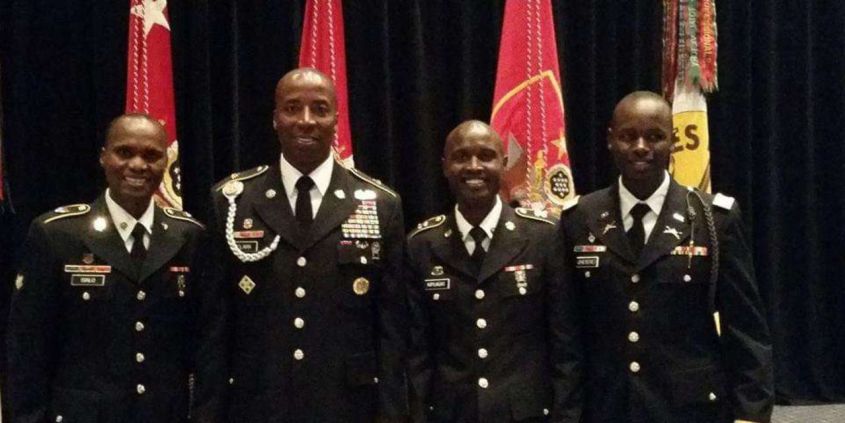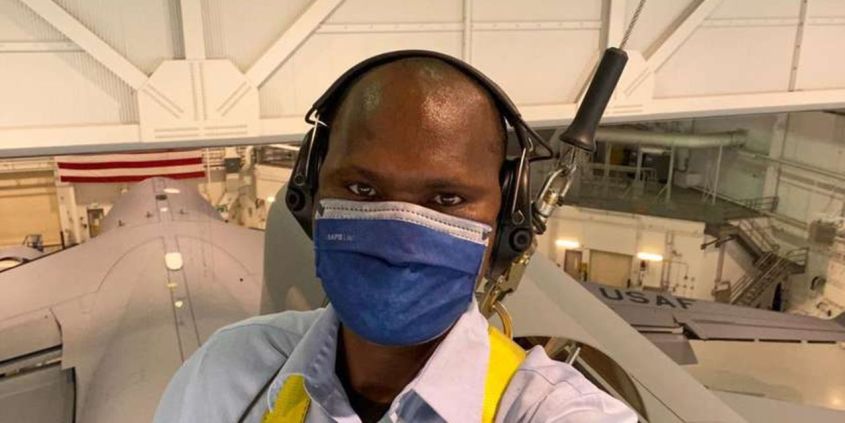By ELIAS MAKORI | NATION
What are the chances of a young man from Baringo County, Kenya turning out to be a lead health expert at the United States Air Force, the world’s greatest air force? One in 50 million, I could say. That’s why Baringo-born American Laban Sialo must be pinching himself as he climbs to the top of a C-17 transport aircraft’s tail to conduct a noise survey during diagnosis and repair.
Sialo, 37, is an industrial hygienist at the US Air Force, currently based in Alaska where he was deployed in January last year.
Growing up in Koibatek, Eldama Ravine, Sialo wanted to be a great runner, but initially started off focusing on the 400 metres hurdles and 1,500 metres in high school, growing up where track and field wasn’t really highly regarded.

The Rise of the African Multinational Enterprise: The most authoritative book on private enterprise in Africa. Get a Copy from SPRINGER
He also threw the javelin, though he never quite took it seriously. Then he made a major breakthrough in 2009 when he travelled to USA.
“I always dreamed of pursuing my education in the US, but I didn’t know how until I learned about the athletics scholarship from Nahashon Kibon,” he narrates. Kibon is a respected former athlete who currently engages in management of the sport and for many years has represented sportwear giants Nike’s interests in Kenya.
“I met coach Jon Murray of Texas Tech University in 2006, courtesy of Nahashon, and learned of eligibility process to compete in the US on athletics scholarship,” Sialo explains.
“Nahashon had already worked with several athletes who had travelled abroad and succeeded and he inspired me to start serious training.”
Sialo had joined an athletes training camp in Kamobo, Kapsabet, run by Peter Rono, Kenya’s 1,500m gold medalist at the 1988 Seoul Olympic Games.
“I met many runners with the same goals and ambitions and we trained together.
Blood line of athletics
“During my training at Kapsabet, we had our team mates picked by US colleges and they kept leaving to the US and that highly motivated us. Seeing my team mates getting selected and being offered scholarships kept me going,” he recalls.
Sialo was motivated by the fact that he came from a blood line of athletics, with the most successful family member being Pauline Kong’a, Kenya’s national champion in the 5,000m in 1996, the year she also won a silver medal in the distance at the Atlanta Olympics.
After landing a track scholarship at the University of Central Missouri, he enrolled for a Business Administration programme.
“I had plans to continue with my running after college.
“My ultimate goal was to run in Boston and Berlin marathons and make wealth through athletics.I knew that I could get support to train and be very successful in running while in the US where food and shelter were offered, but that mind set changed over the summer of 2009 when school closed for summer break and everyone left.”
This is when Sialo realised that he had to work to pay his rent, bills and utilities, and also that it’s important to plan for life outside athletics.
“NCAA Division II schools do not offer scholarships, or assistance with living expenses during the three months long summer break,” he explains.

“I had to work on the school farm and school cafeterias to make ends meet. I also got a lot of injuries in 2009 and I was demoralised. The kind of injuries I got made me realise that running does not last forever.
“I wanted to pursue a major that will support me after my collegiate running but I was confused. The Kenyans I met discouraged me from pursing Business Administration Major since there were no office jobs for black people especially the ones who just came from Africa.
“Most Kenyans who were studying nursing programmes mentioned great things about being a nurse, the high probability of getting a job and the generous remuneration attached to the job.”

Pool
Sialo was then convinced to change his major to nursing, but after a semester into the nursing programme, he would realise he didn’t quite have the passion to be a nurse. He dropped it.
“Luckily, I met three Ghanaians who gave me the best career advices and changed the course of my career for good. These three Ghanaians advised me to pursue a Bachelors Degree in Occupational Health and Safety and add a Masters in Industrial Hygiene.
“I found passion in helping others prevent exposure to occupational injuries and illnesses and I am glad I listen to the advice!”
He then secured his Masters in Industrial Hygiene in 2016 after having studied a bachelor’s programme in Occupational Safety and Health at the University of Central Missouri, graduating in 2013.

Pool
He would then join the military through the Military Accession Vital to National Interest (MAVNI) programme, which has since been suspended by President Donald Trump.
This is a programme that allowed the recruitment of international or non-US citizens to join the military in return for expedited path to US citizenship.
“I immediately signed up when I realised that the Kenyan constitution allows for dual citizenship,” he narrates. “Being a US citizen would have opened more opportunities for my running and professional career.”
It took 90 days for the process to go through. “I underwent vigorous investigations and almost everyone who knew me was interviewed.
“Being a collegiate student athlete gave me a great advantage and made it easy to join and successfully complete the training.

“Unlike Kenyan military recruitment, US military recruitment is open and transparent, only your qualifications are needed.”
Basically, how does his typical day at work at the US Air Force look like?
“My work entails protecting military personnel and military civilians from occupational hazards,” he explains.
“I focus more on occupational health hazards such as chemicals, radio frequencies, occupational illnesses, airborne infectious diseases, noise, radiation, asbestos, ergonomics, thermal stress among others.
“I quantify those hazards and recommend the best abatement options and controls which sometimes requires millions of dollars to implement.
Respiratory protection
“For instance I manage the installation respiratory protection programme and I have to write plans and procedures which ensures that all personnel are adequately protected from respirable particulates and airborne infectious diseases like the current Covid-19.”
Two of Sialo’s seven siblings have taken up athletics, but he requests me not to delve too much into his personal life owing to the fact that the US Department of Defence Privacy Programme outlaws exposure of personally identifiable information especially one’s date of birth, marital status and rank.
A section of the rules guards against exposure of information about an individual that identifies, links, relates, or is unique to, or describes him or her. Moving on, one of Sialo’s greatest regrets in life was the quick transition from track and road running to the full marathon without adequate preparation.
In his running career in the military, Sialo won numerous races, including the Army-Ten Miler, the Marine Corps Marathon and Cross Country Championship, which led to his selection to the US Armed Forces team to the 2015 World Military Games in South Korea.

Then enlisted in the Second Infantry Brigade Combat Team’s Fourth Infantry Division, Sialo, however, failed to finish the marathon, perhaps his greatest disappointment.
“I got seriously injured during the World Military Games due to inadequate preparation caused by other military assignments,” he explains. “I had just returned from a deployment when I was informed that I had been picked to represent the United States in the World Military Games in South Korea (in 2015).
“I only had three months to prepare for a marathon which didn’t work out. The injury ended my professional career.”
What about his greatest triumph in life? “My greatest triumph is achieving my educational goals. I was the first one in my family to get a college degree which at the time was almost impossible especially because my family came from a humble background but my dedication in running and focused attention made it possible.”

Pool
Interestingly, he had never really thought he would succeed in joining or working at the Air Force.
“I have wanted to join US Air Force, but thought it was very difficult for someone from Kenya to join the greatest air force on the universe.
“I kept thinking about Bio-environmental Engineering Department of the Air Force when I was in the army, but didn’t know exactly how I could join. But with God and a strong will to succeed it happened years later.”
His advice for young people growing up in Kenya to learn from his example? “Don’t settle for less. You are only limited by your own will. “No human is limited” and “Dreams are Valid.”

Pool
“They should continue pursuing their dreams no matter how long it will take, with a will to succeed, their dreams will come true, someday.”
Before moving to his current base in Alaska in January last year, Sialo lived in Colorado Springs where he was stationed and trained as a military athlete. He describes his new base at Alaska, feared for its biting cold, as “paradise on earth.”
“Alaska is paradise on earth if you are ready to cope with winter colds.
“The summers are great and they have great fish. They have beautiful mountains and untouched natural forests. There are few Kenyans here but I guess Kenyans don’t like the cold…”
Read from source Nation
